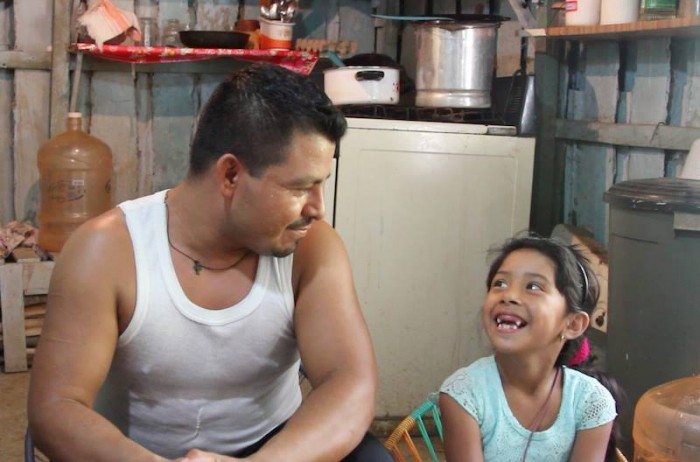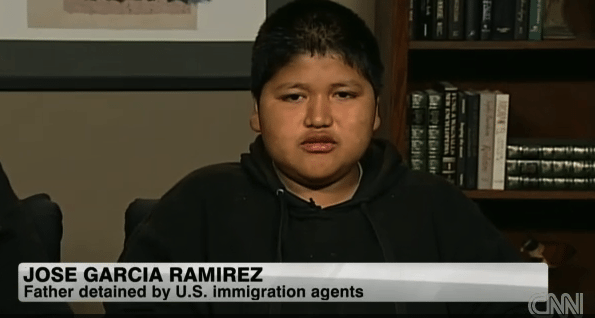Public health researchers and sociologists are showing that living in a deportation state has a real health cost that is being disproportionately paid by citizen children. According to these experts, immigration is no longer just a policy issue; it is a national public health concern. Deportation-centered policies affect American families. Of those deported in the United States, nearly one in four deportees are parents of U.S. citizens. The impact on U.S.-born children becomes clear when considering that within the Latino community—one in four children are born into families where at least one parent is undocumented, or a mixed status family. The issue becomes even larger when considering that across the nation, where one in eight children born in the U.S. are born into mixed status families.


After Jaime was deported to Tijuana, his two children were placed in foster care.
Negative Health Outcomes and “State Violence”
Dr. Edward P. Vargas, assistant professor in the School of Transborder Studies at Arizona State University, has found that anti-Hispanic, anti-immigrant climates, combined with punitive immigration policy, can have negative health impacts on mixed-status families, especially harming U.S.-born children. Vargas calls his findings evidence of “state-sponsored violence.”
“The state pays people to disrupt families,” he tells Latino Rebels. “That’s the scary part. [Deportation policy] is disrupting families, families who in the large majority are hard-working. Families who are trying to live the American dream.”
Public health researchers focus on the social determinants of health, or the wider forces and circumstances of where people work, grow, and live. They recognize that social policies play a part in shaping health. Vargas’ research shows that mixed-status families report worse health for their children compared to Latino families who are all citizens.
Only 37 percent of Latino families in the U.S. are families where every member of the family is a U.S. citizen, but the odds that those families report optimal health are 2.9 times larger than mixed-status families. Vargas’ research indicates that immigration policy has created an environment that is unhealthy for mixed-status families, in which they feel unwelcome and experience constant high levels of stress and anxiety.
Children especially are in a constant state of fear, worrying that their parents could be deported at any moment. Stress is connected to high levels of inflammation, which can exacerbate chronic conditions and compound other factors that contribute to poor health. These levels of stress at such a young age can have negative health implications for the youth at every stage of life.
Researchers have also noticed that the “Latino immigrant health advantage,” in which low-income Latino immigrants had better health outcomes compared to other low-income citizen communities, is eroding. Previously, low-income Latino immigrant mothers’ children were born with higher birth weights and were less likely to die in the first year of life. In states with punitive immigration policies those health advantages are declining.
Researchers at the University of Michigan found that the impacts of immigration raids and the subsequent stress lowered birth weights of children born to Latina mothers in the community, regardless of citizenship or immigration status. In their study on a community in Iowa, Latino children born 37 weeks after one of the largest immigration raids in U.S. history had a 24 percent greater risk of being born with a low birth weight.
Mixed-status families are also less likely to access social services like Medicaid and Women, Infants, and Children (WIC) for fear of deportation, even though their citizen children qualify for the programs. The purpose of WIC is to provide nutritious food and nutrition education to low-income women, infants, and children in order to improve health. Vargas determined that for every one percent increase in risk for deportation, the odds of enrolling in WIC fell by 97 percent.
Furthermore, citizen infants and toddlers of mixed-status families experience delays in early cognitive development because of their parents’ tenuous economic position and immigration status. Vargas found that a Latino child who personally knew someone who has been deported has a 32 percent higher chance of being diagnosed with a learning disorder.
Citizen Children and “Multigenerational Punishment”
University of California-Irvine sociologist, Dr. Laura E. Enriquez observed that citizen children are sharing their parents’ fears of deportation and experiencing the same psychological, social, and economic impacts associated with undocumented status. In her research, she calls this “multigenerational punishment,” a development where laws meant to punish non-citizens spill over and actually harm citizen children.


“The children are doing a lot of the work to help their parents negotiate their immigration status. They’re internalizing illegality. Even though they’re citizens, they’re still learning to operate as if they were undocumented, in how they’re policing their own and their parents’ activities,” Enriquez explains.
American citizen children are living life under extreme systems of surveillance with the constant fear that they are at risk and their families will be torn apart. These fears and realities affect their social connections, usually limiting their friendships to other children of undocumented immigrants. They live in poorer neighborhoods because their parents make less money. They even tend to drive differently than their non-mixed-status peers. Even though they have state-issued driver’s licenses, they avoid the same areas as their parents and follow their strategies to avoid drawing attention to themselves. They share a fear of law enforcement agencies and are similarly wary of hospitals and doctors, even though they are U.S. citizens.
“It’s seeping into families. It’s a family experience of illegality,” Enriquez says of the effects of deportation-centered policies.
Long-Term Social Impacts of “Life Course” Problems
Gilberto Lopez, a research assistant professor of surgery at the University of Rochester School of Medicine who conducted public health research at the T.H. Chan School of Public Health at Harvard University, remembers his family’s fears in just going out to eat at a restaurant when he was a child in the 1980s. His parents were undocumented and after they regularized their status under the 1986 Immigration Reform and Control Act (IRCA) there was a real sense of relief in the family. The ordinary daily tasks that used to bring stress, no longer worried them. Today, as a public health researcher, he understands the children’s anxieties and the long-term negative health implications of punitive immigration policies.
He and other researchers take into consideration the life course perspective—the concept that emphasizes the cumulative effect of early stressers at a young age to negative health outcomes at old age, like mental health problems, cardiac arrest, and chronic disease. Negative health stressers have a snowball effect over a life time, meaning unhealthy young populations will most likely be unhealthier older populations.
If young U.S.-born Latinos are experiencing these levels of stress now, they will continue to feel its effects for decades.
“This [Latino] population is young, but you don’t have to follow them their whole lives in these toxic environments to predict outcomes. We don’t have to wait. We can extrapolate from other populations [about the negative effects],” Lopez says.
This has clear implications for the nation’s future. Current policies are hurting American children now in ways that will continue to impact them as adults in the future. U.S.-born Latinos are the youngest population group in the nation. Their median age is 19, while their most common age is eight. Researchers have shown that current policies are making U.S.-born Latinos unhealthier and placing them at greater health risk in the future.
As this population ages and accounts for a larger percentage of the work force, the poor health of this group can bring higher health costs, lower productivity, limit economic growth, and impact the tax base at the same moment that the Baby Boomer generation is pulling more money out of social programs.
For the researchers, there are clear policy solutions that can improve the health outcomes and conditions of mixed-status families. DACA was an example that was beneficial but still flawed because it ignored the parents of undocumented and citizen children. For Enriquez, positive comprehensive immigration policies must take into account the larger interconnected lives that people make for themselves as they live day in and day out:
We need to create legislation that’s going to address these forms of punishment not only to improve the lives of these undocumented individuals, but also their citizen children, their partners, and community members. This is an American issue. It’s a community issue. It’s a family issue. We need immigration laws that are going to recognize the humanity of our families.
***
Aaron E. Sanchez is a Texas-based writer who focuses on issues of race, politics and popular culture from a Latino perspective. He holds a Ph.D., with a concentration in U.S.-Latina/o intellectual history. He is a happy husband, proud father and an avid runner. He blogs at CommentaryandCuentos.com. You can connect with him @1stworldchicano.


